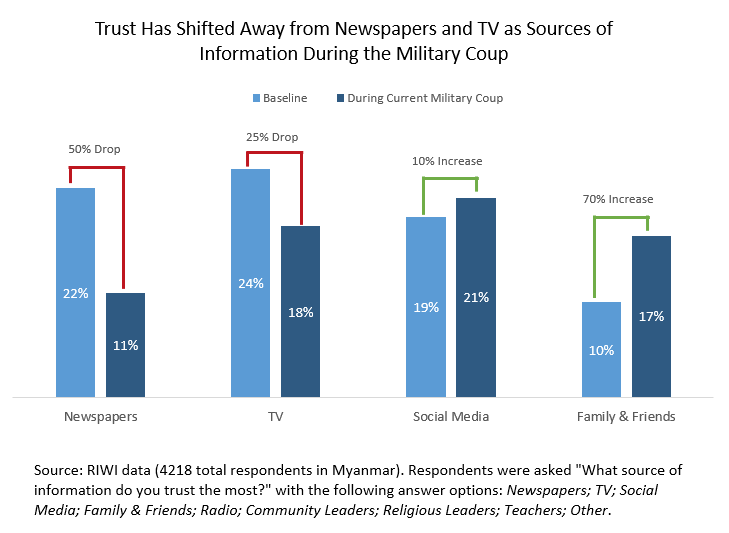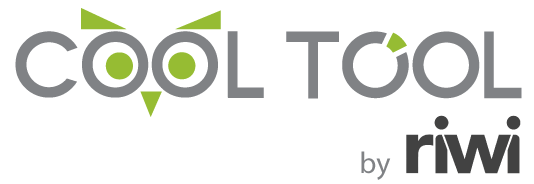Data are current as of March 1, 2021, 21:00 Myanmar Standard Time (GMT +6:30)
Following the February 1st military coup in Myanmar, the junta have sought to restrict the flow of information between protestors and out of the country. While the international community has struggled to gain reliable information, RIWI launched a rapid response effort to gain insight into citizen sentiment toward the military coup.
Myanmar’s coup has cast an opaque smokescreen, making it increasingly difficult for reliable information to enter or exit the country. To better understand the degree to which citizens support the ongoing protests, and their reliance and trust in sources of information, RIWI has been collecting data from citizens across the country. Since February 6th, 2021, RIWI has engaged over 2,000 citizens in Myanmar with the purpose of uncovering how the coup is affecting the sources people trust and rely upon for credible and potentially life-saving information all in the context of reduced access to information, reported internet shutdowns, and increased fragility on the ground.
In the first few weeks of the coup, social media platforms including Facebook (the largest online platform in Myanmar) were shut down, and the internet was reportedly shut off. These efforts sought to curb protestors from communicating and sharing vital information about the coup, both within and beyond Myanmar’s borders. However, despite these efforts, we observed a significant increase in trust in the information gained from social media when compared with pre-coup sentiment.

Social media is one of the last mediums where complete control and censorship has yet to be achieved in Myanmar and it is under increasing threat. Prior to the coup, television was the most trusted source of information in Myanmar, followed by newspapers. Since the coup, announcements that action will be taken against protestors have been published through traditional media alongside calls to halt pro-democracy demonstrations. As such, trust in television and newspapers have fallen, while trust in non-government-controlled sources (social media) has risen. One in five respondents trust social media most, making it the most-trusted source of information among the 9 options given to respondents in this question. This figure has increased since this wave of data collection began, indicating a potential for this gap to continue widening. Interestingly, “family and friends” are cited as the second most trusted information source in Myanmar since the coup, gaining 7 points, further solidifying the notion that people are increasingly hesitant to trust traditional media sources and instead are pivoting toward individuals and communities for important information.
While social media has a controversial history in Myanmar, as Facebook’s dissemination of information and use of certain algorithms have been identified as playing a “determining role” in enacting genocide against the Rohingya, these data demonstrate that social media remain a means by which people gain vital information in Myanmar, beyond the controlled government and military channels. These findings underscore the desire people in Myanmar have for the truth and the importance placed upon accessing it; turning to sources that, even while potentially inaccessible, are the only ones that have yet to be manipulated in full.
There may be no end in sight to the protests, but there may be for freedom of expression on social media in Myanmar. The widely rebuked new cybersecurity law which was leaked in the last few weeks would inherently change the way information can be shared, accessed, and internalized as a new layer of censorship will be applied. Where protestors have been able to seek information and share anti-coup sentiment online, they may now face charges which may act to suppress expression on these platforms. In such a context, access to citizens’ true sentiment will become even more difficult for the international community to ascertain, and Myanmar’s people will be at greater risk of falling behind the thickening veil of secrecy enacted by the military regime.
RIWI has unique capabilities which mean that the surveys, content, and campaigns deployed on our platform cannot be censored, blocked, or tracked. This enables us to rapidly and safely engage citizens in complex contexts on topics of vital importance. RIWI seeks to uncover the truth by listening to those who otherwise would not be able to be heard. We are proud to share this information with partners working to expose the truth and deliver justice in Myanmar.
Contact us at ask@riwi.com to discuss the information available and our capabilities in Myanmar or other fragile environments.
